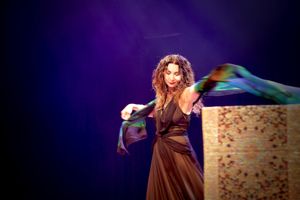REVIEW
SHOLE WOLPÉ PERFORMS: THE CONFERENCE OF THE BIRDS
September 7, 2018
Io Myers Studio, UNSW Campus Kensington
In terms of categorising the arts, a poetry recitation can often rest awkwardly somewhere between literature and theatre; not entirely made up of either, but crafted from aspects of both. At its apex, however, it can become its own entity, something that marries the careful meter of words on the page with the performative nature of their emotional weight. So it is for Sholeh Wolpé's recitation of "The Conference of the Birds".
Photos: LEILAH SCHUBERT
▲
▲
▲
▲
▲
▲
▲
▲
▲
▲
▲
A celebrated Iranian-born poet, Wolpé is the inaugural 2018 Writer-in-Residence at UCLA and author of three collections of poems, including the recently published Keeping Time with Blue Hyacinths. On the evening of this performance, it's almost 20 minutes before Wolpé herself steps out onto the stage, and the hypnotic energy she creates is instantly tangible. The music filtering through the space – the gentle strains of the Indian santoor, the steady rhythm of the tonbak, a Persian goblet drum, and the daf, a Middle Eastern frame drum – all punctuate Wolpé's words carefully. The atmosphere of the night is key. Without the mysterious, hazy red lighting and instrumental effects, Wolpé's candid intensity might be lost, or shielded. Here, it can be experienced in its full effect.
Wolpé sets the tone for the evening, beginning with her wretchedly beautiful How Hard is it to Write a Love Song? The dichotomy of the imagery is expertly woven to ask that titular question; the back-and-forth between the imagery of the Kalashnikov and the hummingbird, the shooting and the bougainvillea, the attack and the child's joyful yells. In this current era, where bad news is perpetually at our fingertips, where unspoiled joy can seem all too rare, how can we, indeed, appreciate the simple pleasures of life? Wolpé continues with her poetry, driving through Letter to America with a ragged desire; "I dreamed/you every single night with the ferocity/of a lost child until you became true like flesh." The power here is inescapable.
Each of these poems moves through the poet's own life, through her past selves, into her childhood when her fascination with America began, through her schooldays, to an exploration of her own cultural identity. There is an aching candour to this; "Home is a missing tooth," and "I have an accent in every language I speak". Wolpé's mesmeric presence is not destroyed by this directness, rather, it is created by it. This examination of cultural identity echoes Sufi mystic poet Attar's idea of unity in diversity, a much-needed power in the turmoil of modernity.
Moving into the crowning jewel of the evening, Wolpé recites selections from her translation of Attar's masterpiece; The Conference of the Birds. This allegorical tale describes the birds' decision to seek out their leader, the 'Simorgh' of legend, but to do so they must put aside their sins and failings to travel through seven valleys, facing peril and destruction as they move towards enlightenment. Wolpé uses only her voice and a diaphanous silk scarf to hew each of these avian characters from within herself. In doing so, she calls for an honest examination of the self; the lovesick nightingale, the vain parrot, the miserly partridge are perpetually accessible caricatures, even today. And yet, despite all that, we are left with a message of unassailable hope, as Wolpé promises us, "an iota of love is greater than all the world."
When the evening is over, and Wolpé beckons the audience down to dance, there is a moment of warm, somnolent silence as we slowly come back into ourselves. Reading poetry is one thing, but being immersed in it, submerged in it, is something else entirely.
